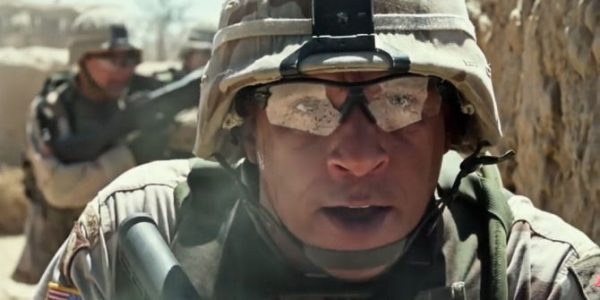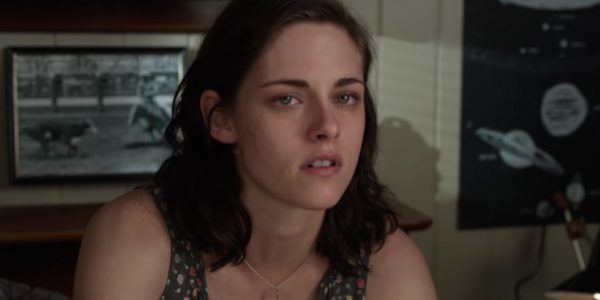A wartime film is nothing new. Seeing the drama and trauma of a soldier on the battlefield and then returning home is something that has been done, too. What makes
Billy Lynn's Long Halftime Walk different is the promised visual experience and the depiction of his thoughts of life in the US after the battle. The challenge for acclaimed director Ang Lee (
Life of Pi) will be to offer something new to a familiar storyline. The question will be if the new technology will offer a visual experience like pull us into the story or is it merely a gimmick to draw audiences into theaters?
Billy Lynn’s (Joe Alwyn) life has taken a surreal turn. Only a few months earlier, he had been fighting alongside Bravo Squad in Iraq. Through the challenges of the heat and conflicting culture, he and his squad serve the people of Iraq in 2004. After an intense battle with insurgents, he is rewarded a Silver Star for bravery and his team is brought back to the US for a publicity ‘Victory Tour’. As they stop over in Dallas to be part of the half-time entertainment show of the professional football game, they must confront the culture shock of being back in the land of the free and battle through their personal battlefield demons.

Celebrated director Ang Lee brings the acclaimed novel to life in a cutting edge technological manner. He delves into the lives of these young men and provides a study of how these soldiers have lived a lifetime in just a few short years. The result turns into a hard lesson in trying to do too much with one film. The quality of production and the strength of a story which is apparent it's the implementation proves to be where the film comes undone. There have been a vast number of articles written on the ultra-high frame rate, but most cinemas cannot accommodate this technology. The future will tell the impact of this innovation and the value its development, but how does it impact the storytelling?
Leaving the technology to the side and analyzing the film on its own merits is also difficult. The direction seems to be so reliant on the technology to provide the full immersion experience, that Lee fails to remember what has made his films great in the past, the quality of the story. Novelist Ben Fountain provides a fascinating view into the life of a soldier, but there is a disconnect in getting it to the screen. Ang Lee's storytelling abilities always include a philosophical and non-linear manner, but when he is at his best, things come together effectively in the end. With
Billy Lynn’s Long Half Time Walk, Lee’s signature style almost becomes his undoing. If the audience is able to follow the narrative between the multitude of flashbacks, dream sequences and stark realities of these 24 hours of Billy’s life, it can be a fascinating journey into the psyche of this young warrior. Unfortunately, it may be difficult for most people to grasp what is happening within this spiritual quagmire and may wish that the technology did work better to help with distracting them from what is or is not happening on screen.

Fountain’s take on the minds of young men exposes what happens within this testosterone driven realm. It is confronting and more real than many want to admit, but most men would understand the struggles of Bravo squad. Lee's attempt to translate this on the big screen does have its difficulties, but the overall experience does land some key body blows that will appeal to select parts of the viewing public. The acting support was spot on for this effort. Garrett Hedlund, Vin Diesel, Kristin Stewart and the rare performance by Chris Tucker provide the newcomer Joe Alwyn with the depth needed to showcase Lee’s ability to get the most out of his cast. Even though Alwyn is an acting novice, he does hold his own amongst this seasoned cast.
Ang Lee has set himself up for exceptional scrutiny with his well-documented technological venture which seems to have led him to distraction, but in the end, this film is not a complete misfire.
Billy Lynn’s Long Half Time Walk has some notable highlights and still carries some of the magic of this talented filmmaker. It may not be his best work, but it is still a film worth seeing, analyzing and pondering some of life's bigger issues.
 Celebrated director Ang Lee brings the acclaimed novel to life in a cutting edge technological manner. He delves into the lives of these young men and provides a study of how these soldiers have lived a lifetime in just a few short years. The result turns into a hard lesson in trying to do too much with one film. The quality of production and the strength of a story which is apparent it's the implementation proves to be where the film comes undone. There have been a vast number of articles written on the ultra-high frame rate, but most cinemas cannot accommodate this technology. The future will tell the impact of this innovation and the value its development, but how does it impact the storytelling?
Leaving the technology to the side and analyzing the film on its own merits is also difficult. The direction seems to be so reliant on the technology to provide the full immersion experience, that Lee fails to remember what has made his films great in the past, the quality of the story. Novelist Ben Fountain provides a fascinating view into the life of a soldier, but there is a disconnect in getting it to the screen. Ang Lee's storytelling abilities always include a philosophical and non-linear manner, but when he is at his best, things come together effectively in the end. With Billy Lynn’s Long Half Time Walk, Lee’s signature style almost becomes his undoing. If the audience is able to follow the narrative between the multitude of flashbacks, dream sequences and stark realities of these 24 hours of Billy’s life, it can be a fascinating journey into the psyche of this young warrior. Unfortunately, it may be difficult for most people to grasp what is happening within this spiritual quagmire and may wish that the technology did work better to help with distracting them from what is or is not happening on screen.
Celebrated director Ang Lee brings the acclaimed novel to life in a cutting edge technological manner. He delves into the lives of these young men and provides a study of how these soldiers have lived a lifetime in just a few short years. The result turns into a hard lesson in trying to do too much with one film. The quality of production and the strength of a story which is apparent it's the implementation proves to be where the film comes undone. There have been a vast number of articles written on the ultra-high frame rate, but most cinemas cannot accommodate this technology. The future will tell the impact of this innovation and the value its development, but how does it impact the storytelling?
Leaving the technology to the side and analyzing the film on its own merits is also difficult. The direction seems to be so reliant on the technology to provide the full immersion experience, that Lee fails to remember what has made his films great in the past, the quality of the story. Novelist Ben Fountain provides a fascinating view into the life of a soldier, but there is a disconnect in getting it to the screen. Ang Lee's storytelling abilities always include a philosophical and non-linear manner, but when he is at his best, things come together effectively in the end. With Billy Lynn’s Long Half Time Walk, Lee’s signature style almost becomes his undoing. If the audience is able to follow the narrative between the multitude of flashbacks, dream sequences and stark realities of these 24 hours of Billy’s life, it can be a fascinating journey into the psyche of this young warrior. Unfortunately, it may be difficult for most people to grasp what is happening within this spiritual quagmire and may wish that the technology did work better to help with distracting them from what is or is not happening on screen.
 Fountain’s take on the minds of young men exposes what happens within this testosterone driven realm. It is confronting and more real than many want to admit, but most men would understand the struggles of Bravo squad. Lee's attempt to translate this on the big screen does have its difficulties, but the overall experience does land some key body blows that will appeal to select parts of the viewing public. The acting support was spot on for this effort. Garrett Hedlund, Vin Diesel, Kristin Stewart and the rare performance by Chris Tucker provide the newcomer Joe Alwyn with the depth needed to showcase Lee’s ability to get the most out of his cast. Even though Alwyn is an acting novice, he does hold his own amongst this seasoned cast.
Ang Lee has set himself up for exceptional scrutiny with his well-documented technological venture which seems to have led him to distraction, but in the end, this film is not a complete misfire. Billy Lynn’s Long Half Time Walk has some notable highlights and still carries some of the magic of this talented filmmaker. It may not be his best work, but it is still a film worth seeing, analyzing and pondering some of life's bigger issues.
Fountain’s take on the minds of young men exposes what happens within this testosterone driven realm. It is confronting and more real than many want to admit, but most men would understand the struggles of Bravo squad. Lee's attempt to translate this on the big screen does have its difficulties, but the overall experience does land some key body blows that will appeal to select parts of the viewing public. The acting support was spot on for this effort. Garrett Hedlund, Vin Diesel, Kristin Stewart and the rare performance by Chris Tucker provide the newcomer Joe Alwyn with the depth needed to showcase Lee’s ability to get the most out of his cast. Even though Alwyn is an acting novice, he does hold his own amongst this seasoned cast.
Ang Lee has set himself up for exceptional scrutiny with his well-documented technological venture which seems to have led him to distraction, but in the end, this film is not a complete misfire. Billy Lynn’s Long Half Time Walk has some notable highlights and still carries some of the magic of this talented filmmaker. It may not be his best work, but it is still a film worth seeing, analyzing and pondering some of life's bigger issues.